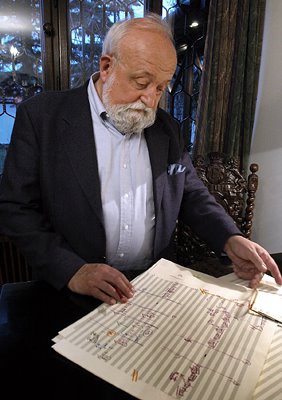Penderecki on Présences Festival
 Last year's Présences Festival, the annual contemporary music festival hosted by Radio France, was devoted to Marc-André Dalbavie (see my post from February 3, 2005). This year, the honoree is Polish composer Krzysztof Penderecki, who is remembered for some daring experimental pieces he composed in the 1960s (like Threnody to the Victims of Hiroshima) but who has turned since then to much more traditional structures. Orchestras will play, apparently for the first time ever, all of Penderecki's symphonies in concerts to be broadcast on the radio during the two weeks of the festival, which starts today. Have I mentioned lately how much NPR and PBS stink? To mark the occasion, Christian Merlin published an interview (Penderecki : un néoromantique qui s'assume, February 2) in Le Figaro (my translation):
Last year's Présences Festival, the annual contemporary music festival hosted by Radio France, was devoted to Marc-André Dalbavie (see my post from February 3, 2005). This year, the honoree is Polish composer Krzysztof Penderecki, who is remembered for some daring experimental pieces he composed in the 1960s (like Threnody to the Victims of Hiroshima) but who has turned since then to much more traditional structures. Orchestras will play, apparently for the first time ever, all of Penderecki's symphonies in concerts to be broadcast on the radio during the two weeks of the festival, which starts today. Have I mentioned lately how much NPR and PBS stink? To mark the occasion, Christian Merlin published an interview (Penderecki : un néoromantique qui s'assume, February 2) in Le Figaro (my translation):
Are you going to stay in Paris for the entire Présences Festival?Penderecki is apparently a tree-lover and is the owner of an arboretum in Poland, containing more than a thousand species of trees. To be sure, he is worried about the record cold temperatures that have been recorded lately in central Europe.
Of course! It's a unique opportunity for me to hear my complete symphonies in two weeks: it's the first time it's ever happened, and I've been dreaming about it.
Is there unity in your symphonies in spite of the stylistic diversity?
In my symphonies, certainly. Besides the first one, which is a synthesis of the styles of my early period and is an examples of an aesthetic that I have since abandoned, I am convinced that there is, from the second to the eighth one, both unity and continuous evolution, as if they were a cycle. You will realize that during the opening concert on Friday, during which I will myself conduct the second and eighth symphonies: although separated by time, they are linked together.
When you speak of an aesthetic you have since abandoned, are you alluding to your break with the avant-garde, in the 1960s, in favor of a more traditional vocabulary?
I am not saying that there is nothing left of postwar modernism, and to be sure names like Boulez, Stockhausen, or Nono will be preserved by posterity (I am less drawn to Berio). But I very quickly had the feeling that that musical language was obsolete: it had had its time and could never be repeated. The musical material itself was tired. I then rediscovered the post-Romanticism that I used to love in my youth (I have a passion for Bruckner and Sibelius), and I realized that this fullness of sound pleased me, so much that I am basically a polyphonist.
Are you hurt by the critics who have charged you with complacency?
Not at all. I have always followed my path, on my own, and no one can tuck me into a drawer. My neo-Romantic works are played a lot, and I enjoyed composing them: there is nothing artificial about them, it's music that flows naturally from me.
You announced your intention to stop with a ninth symphony. Are you superstitious?
Yes. Since Beethoven, the number 9 is unavoidable, and things have always gone rather badly for those who have tried to compose a tenth symphony. So I prefer to stop at 9, but first I have to finish my sixth, which is still in sketches. It will be premiered by the Vienna Philharmonic.
UPDATE:
The review by Pierre Gervasoni (Penderecki ou le romantisme régressif, February 5) for Le Monde was about as negative as it could get (my translation):
With two symphonies, the second and eighth, created respectively in 1980 and 2005, the opening concert presented, alas, only Penderecki's neo-Romantic output. The interest of the program, therefore, was really only in the fact that the composer himself was conducting the Orchestre philharmonique de Radio France. [...] The elegant septuagenarian took off his glasses and, with his nose buried in the score, transformed himself into a sort of construction foreman. He wasn't conducting, happy simply to beat time, with gestures so imprecise that one wondered how the orchestra's players managed to play together. More or less, that is, because it was far from perfect. But the full sections, performed with fair cohesion, were like the sound of a typical orchestra from the eastern bloc countries. When it was not sounding like a vain imitation of Bruckner, Strauss, or Mahler, Penderecki's second symphony evoked Shostakovich, with less sarcasm.Ouch.





















































No comments:
Post a Comment